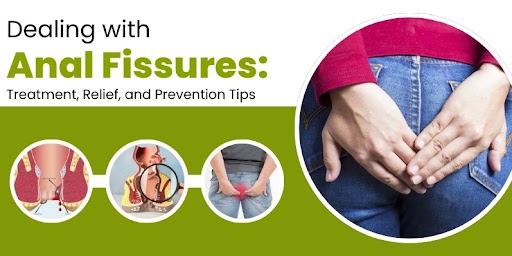Dealing with Anal Fissures: Treatment, Relief, and Prevention Tips

Anal fissures are small tears in the thin lining of the anus that can cause intense pain, bleeding, and discomfort, especially during bowel movements. They are a common condition that affects people of all ages but are often ignored due to the sensitive nature of the area. Understanding how to treat, relieve, and prevent anal fissures can significantly improve your quality of life.
Symptoms of Anal Fissures
Knowing the signs of anal fissures is important for early treatment-
- Sharp pain during or after bowel movements.
- Red blood marks on toilet paper
- Itching or irritation around the anus.
- Visible tear in the anal tissue.
- A small lump near the tear indicates a sentinel pile.
Treatment Options for Anal Fissures
1. Self-Care Remedies
For most acute fissures, simple at-home treatments can promote healing:
- Eat more fiber-rich foods : like fruits, vegetables, and whole grains to soften your stools and avoid straining.
- Hydration: Drink plenty of water to maintain stool consistency.
- Sitz Baths: Soak the anal area in warm water for 10–15 minutes several times a day to relax the muscles and improve blood flow.
Over-the-counter Creams: Use ointments with hydrocortisone or lidocaine to reduce pain and inflammation.
2. Medications
If home remedies don’t help, a doctor might suggest:
- Topical Nitroglycerin or Calcium Channel Blockers: These relax the anal sphincter and improve blood flow, promoting healing.
- Botox Injections: These temporarily relax the anal muscles, easing the tension on the fissure.
3. Surgical Options
Chronic or non-healing fissures may require surgical intervention:
- Lateral Internal Sphincterotomy (LIS): A small cut in the anal sphincter to reduce tension and allow the fissure to heal.
- Fissurectomy: Removal of the damaged tissue to encourage new, healthy tissue growth.
Relief Tips for Anal Fissures
- Don’t sit for too long; use cushions for support.
- Keep the anal area clean and dry to avoid infections.
- Use moist wipes instead of toilet paper to reduce irritation.
- Avoid spicy foods, which may worsen discomfort.
Prevention Tips
Diet and Lifestyle
- Follow a fiber-rich diet to prevent constipation.
- Exercise regularly to improve digestion.
- Avoid delaying bowel movements, as this can make stools harder to pass.
Proper Bathroom Habits
- Avoid holding your breath while passing stool.
- Spend less time on the toilet to reduce pressure on the anal area.
Stay Hydrated
- Aim for 6–8 glasses of water daily to ensure soft stools and smooth bowel movements.
Conclusion
Anal fissures can be painful and disruptive, but with proper care, treatment, and preventive measures, they can heal effectively. By adopting healthy bowel habits, maintaining a balanced diet, and seeking medical advice when needed, you can manage and prevent this condition, ensuring long-term comfort and health.